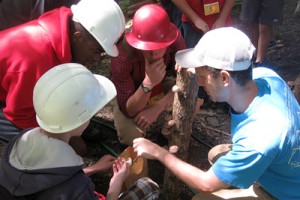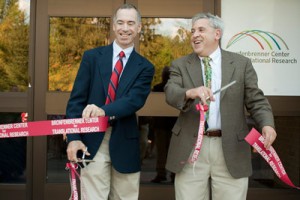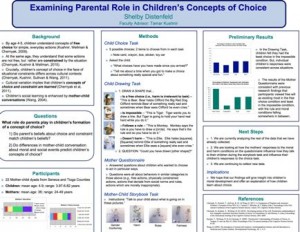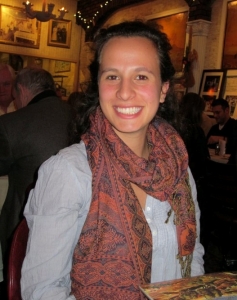By Karene Booker
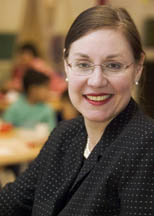
Reyna
This summer a high energy team of Extension Educators and student researchers touched the lives of nearly 100 high school students in New York City and Ithaca.
The project integrates laboratory and field research conducted by Dr. Valerie Reyna, Professor of Human Development and Outreach Extension Leader, Cornell University with extension programming. It is not only Dr. Reyna’s research, but also her vision for engaging community partners in it that drives the project. The research examines factors associated with adolescent risky decision making. The translation of the research into programming aims to promote adolescent health. Collaboration with Cornell Cooperative Extension and community agencies is bringing this project to young people in New York City, Ithaca, and this fall to Broome County.
With greater freedom and independence, adolescents face new risks. We know poor choices can have long-lasting consequences for individuals, families, and society. The project offers two interventions, which serve as control groups for each other. One, Gist-Enhanced Reducing the Risk (RTR+) is targeted at reducing teenage pregnancy and sexually transmitted diseases and the other, EatFit, is targeted at promoting healthy eating and fitness. The project combines empirical research with practical knowledge gained through implementation of the two curricula to inform and facilitate future replications of the programs.
The RTR+ project arm has already proven effective at promoting sexual health. Continued research and enhancement of the program will strengthen the intervention and add to scientific knowledge. Although supported by the research literature, the obesity reduction curriculum is less highly researched. There is a dearth of research on interventions to reduce obesity in adolescents even though obesity is a major health problem in America. The healthy lifestyles and obesity reduction arm of the research is thus groundbreaking and will serve as a basis for future work. Both curricula incorporate hands-on skill building and experiential activities.
Here’s a look at the team members and what they are doing.
The NYC Cooperative Extension team is ably led by Family and Youth Development Program Leader, Jackie Davis Manigaulte. Extension Educators Michele Luc and Eduardo Gonzalez Jr. recruited community partners, recruited students, completed consents from parents and students for the research, taught the curricula, administered surveys, and much more. The Cooperative Extension team was joined for the summer in NYC by graduate student Chrissie Chick and undergrad Claire Lyons. The students assisted with the research and co-facilitated the curricula with the NYC staff at the four partner sites: Central Queens Y; Groundwork, Inc.; Child Center NY; and NYC Mission Society.
 “CUCE-NYC’s Family & Youth Development program area is thrilled to have the opportunity to work with Dr. Reyna and her staff to pilot new and modified evidence-based educational resources on topics of such importance to the health and well-being of adolescents in New York City and throughout the state and country,” said Jackie.
“CUCE-NYC’s Family & Youth Development program area is thrilled to have the opportunity to work with Dr. Reyna and her staff to pilot new and modified evidence-based educational resources on topics of such importance to the health and well-being of adolescents in New York City and throughout the state and country,” said Jackie.
 "The RTR+ curriculum provided the participants with so many opportunities go beyond the traditional messages they've received in typical sex education classes by teaching them how to put refusal skills into action, said Michele. "As one student at the Forest Hills site put it: 'I wish we learned this stuff earlier because no one ever teaches us how to say no effectively and mean it.'"
"The RTR+ curriculum provided the participants with so many opportunities go beyond the traditional messages they've received in typical sex education classes by teaching them how to put refusal skills into action, said Michele. "As one student at the Forest Hills site put it: 'I wish we learned this stuff earlier because no one ever teaches us how to say no effectively and mean it.'"
 "We worked with diverse populations of youth in East New York, Harlem, Jamaica and Forest Hills neighborhoods," added Eduardo."In each of the sites, project participants spoke favorably of their overall experiences and highlighted how the hands-on activities made the sessions both informative and engaging."
"We worked with diverse populations of youth in East New York, Harlem, Jamaica and Forest Hills neighborhoods," added Eduardo."In each of the sites, project participants spoke favorably of their overall experiences and highlighted how the hands-on activities made the sessions both informative and engaging."
 The team was quick to troubleshoot and find solutions to the challenges encountered in this first replication at multiple sites throughout New York City," said Chrissie. "It's been a pleasure working with and learning from Eduardo and Michele. Their dedication is striking."
The team was quick to troubleshoot and find solutions to the challenges encountered in this first replication at multiple sites throughout New York City," said Chrissie. "It's been a pleasure working with and learning from Eduardo and Michele. Their dedication is striking."

“Through my involvement on this project, I have observed the synergy of theory, research, and extension efforts in the community,” said Claire. “It has helped me see how all of the individuals and groups involved in a community-research partnership can work together to achieve a mutual goal.”
 Human Development graduate student Seth Pardo is laboratory manager and project supervisor. He works closely with Dr. Reyna and the research team to develop additional enhancements to curricula based on evidence gathered on the nearly 900 youth in Reyna’s earlier National Institutes of Health funded study of the curriculum. He also implements the project in Ithaca, recruiting partner sites and participants, training personnel, delivering the curriculum, and analyzing data.
Human Development graduate student Seth Pardo is laboratory manager and project supervisor. He works closely with Dr. Reyna and the research team to develop additional enhancements to curricula based on evidence gathered on the nearly 900 youth in Reyna’s earlier National Institutes of Health funded study of the curriculum. He also implements the project in Ithaca, recruiting partner sites and participants, training personnel, delivering the curriculum, and analyzing data.
“Over the past 2 years on this project, I have learned a great deal about how judgment and decision making change over the life course,” noted Seth. “Adolescents are at a crucial juncture in their behavioral and cognitive development; this evidence-based intervention can have an incredibly positive influence on their future.”

“I learned a lot about people and teaching and got a lot of practice perfecting such skills as perseverance, proactive behavior and teamwork” added undergraduate student Gabrielle Tan who assisted Seth with the Ithaca implementation.
 Partner sites in Ithaca included Ithaca High School and TST-BOCES. The two courses were taught to students enrolled in the regional summer school health education class. Travis Getzke and Nikki Fish, experienced Health Educators for TST-BOCES Summer School and enthusiastic accomplices, helped teach the curriculum. This coming school year, Travis will be teaching RTRgist and the EatFit curriculum for the TST BOCES Community School.
Partner sites in Ithaca included Ithaca High School and TST-BOCES. The two courses were taught to students enrolled in the regional summer school health education class. Travis Getzke and Nikki Fish, experienced Health Educators for TST-BOCES Summer School and enthusiastic accomplices, helped teach the curriculum. This coming school year, Travis will be teaching RTRgist and the EatFit curriculum for the TST BOCES Community School.
 “I loved the EatFit curriculum!” said Nikki who taught that component of the project. “It was goal oriented, incorporated both nutrition and fitness, and involved the students in a lot of hands on activities. During class, I overheard one of my students comment to another student about half way through the curriculum: 'This was the best Health class ever.' When I asked her why, she responded: 'because in our regular Health class we never got the chance to do any activities like this!'"
“I loved the EatFit curriculum!” said Nikki who taught that component of the project. “It was goal oriented, incorporated both nutrition and fitness, and involved the students in a lot of hands on activities. During class, I overheard one of my students comment to another student about half way through the curriculum: 'This was the best Health class ever.' When I asked her why, she responded: 'because in our regular Health class we never got the chance to do any activities like this!'"
Behind the scenes but still essential to the project, many dedicated staff handle human resources, finances, technology issues, and administration. Chief among them is Extension Support Specialist Karene Booker who adds her own brand of project management glue to keep the fast-paced operation on track.
The project has been beneficial to everyone involved. The theory and research behind the intervention allows communities to provide their youth with a highly effective intervention to reduce risk taking and improve health. By participating in the research project, youth gain the benefits of the intervention and also provide valuable information that can enhance both scientific knowledge and future interventions targeted to protect youth. Simultaneously, the project is a learning ground for the next generation of researchers and practitioners.
Thanks to all of the people and partner organizations who are making this initiative possible through their daily efforts and ongoing commitment to improving the health of young people.
For more information, please visit our website.
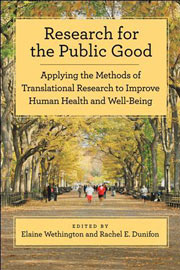 Translational research is often described as a bridge between academia and the outside world, connecting researchers, policymakers and community practitioners to improve human health and development.
Translational research is often described as a bridge between academia and the outside world, connecting researchers, policymakers and community practitioners to improve human health and development.

